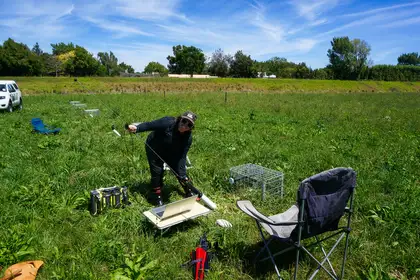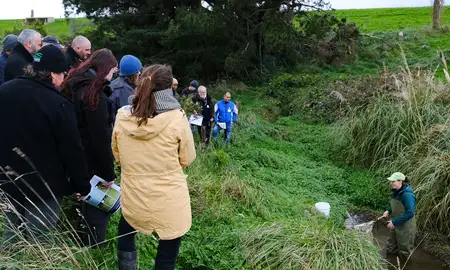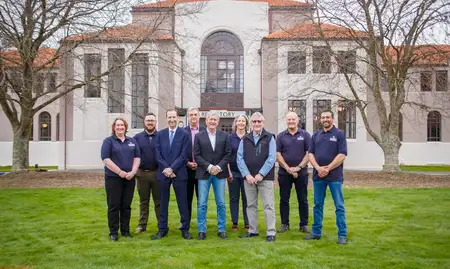
It was through Horizons Regional Council’s Enviroschools scheme that Jiselle found out about the Science Teaching Leadership Programme, that provides opportunities for nominated teachers to connect with science organisations in their communities. Through this programme, teachers gain a deeper understanding of the nature of science and use their experiences to expand their school’s science curriculum to improve teaching and learning.
With over 10 years of teaching experience, Jiselle says she’s excited to build her knowledge to enhance the science programme while forming connections with Te Kunenga ki Pūrehuroa Massey University.
“Science and mathematics have always been my favourite subjects to teach. I love hearing the students engage in discussions, explore concepts and develop their own ideas through activities. It’s incredibly rewarding and there are countless topics to engage students while covering the core ideas of the science curriculum.”
Her placement involves participating in multidisciplinary research through the School of Agriculture and Environment within the College of Sciences, as part of the flagship Whenua Haumanu programme, funded by the Ministry for Primary Industries. The programme explores the impact of contemporary and regenerative pasture management on soil health, water quality, gas emissions, pasture production and quality, animal production and health and welfare, as well as the resulting food produced.
During her placement, Jiselle is working alongside Massey scientists, including her host Associate Professor Lucy Burkitt, to gain valuable insights into the nature of science, including exploring methodologies, sample processing techniques, analysis and stakeholder intentions.
“Being placed in one of the Whenua Haumanu projects has allowed me to explore ecological concepts in more depth and build my content knowledge, which I am using to develop unit plans and investigations. I will be collecting the infiltration across the treatments at Dairy 1 Farm and the Pasture and Crop Research Unit in May. Up until now, I’ve supported suction cup installation and pasture data collection, alongside gaining familiarity with the rhizotrons and lysimeters,” she says.
Despite a few hiccups, Jiselle says the placement has already been a memorable experience.
“Unfortunately, I was the first person to break a suction cup during installation and it’s been made known I’ll never live that down! But the Whenua Haumanu team is such a welcoming and fun group of people to learn from. They have inspired change in practices, and that was illustrated during the Taranaki Regenerative and Sustainable Farming conference. It was a great experience to witness the traction that has taken place from the work of Whenua Haumanu and Catchment Solutions Programmes at Massey.”
With two months completed, she has already been inspired on how to enhance her school’s science programme upon her return in term three. She says the experience has shifted her perspective as an educator.
“There has been immense value in this placement. It’s been insightful experiencing the conversations to explain data and problem-solving within a team that has a broad range of expertise, experience and perspective. Observing discourse and collaboration modelled well within this team of scientists has inspired me to develop this skill in pupils. Listening, thinking, contributing and relating well to others are all key competencies in the New Zealand curriculum that can be developed through an effective science programme.”
Jiselle intends to develop a potential for long-term data collection within classes as an aspect of the science programme, that will result in the accumulation of large data sets.
“Students will have autonomy to collect data for contributing factors, develop their own methodologies, critique the effectiveness of these and explore the difference between correlation and causation, observation and inference. There will be an emphasis on developing the science curriculum capabilities, alongside content knowledge within the topics chosen by the Feilding Intermediate learning community.”
She says the ultimate goal for this collaboration is to nurture students to be positive, engaged and purposeful in the subject of science and extend connections with the university.
“This is the beginning of an exciting relationship with Massey. The relationship has significant potential for promoting higher level education for pupils in science, as well as participation with research communities, critical thinking and making decisions as responsible citizens who practice kaitiakitanga of the whenua and consider kai-demand for society. Already, there are plans for our students to plant the wetland on Dairy 4 Farm, and I’m looking into opportunities for our pupils to gain a familiarity with the university through avenues like Children’s University.”
Related news
Whenua haumanu – nurturing the land through exploring pastoral farming
Strong local and national interest in regenerative farming saw close to 200 people attending an on-farm field day on 28 November, the largest turnout for a farm event at Massey University in 20 years.

Waterway restoration and protection the aim of Massey-led project
A project aimed at enhancing the rural sector’s capability to improve essential freshwater on farms has been awarded funding from the Ministry for the Environment’s Essential Freshwater Fund.

Agriculture Minister visits Manawatū campus to launch Whenua Haumanu
The most comprehensive study of pastoral farming ever undertaken in New Zealand was launched today by Agriculture Minister Hon Damien O’Connor.
